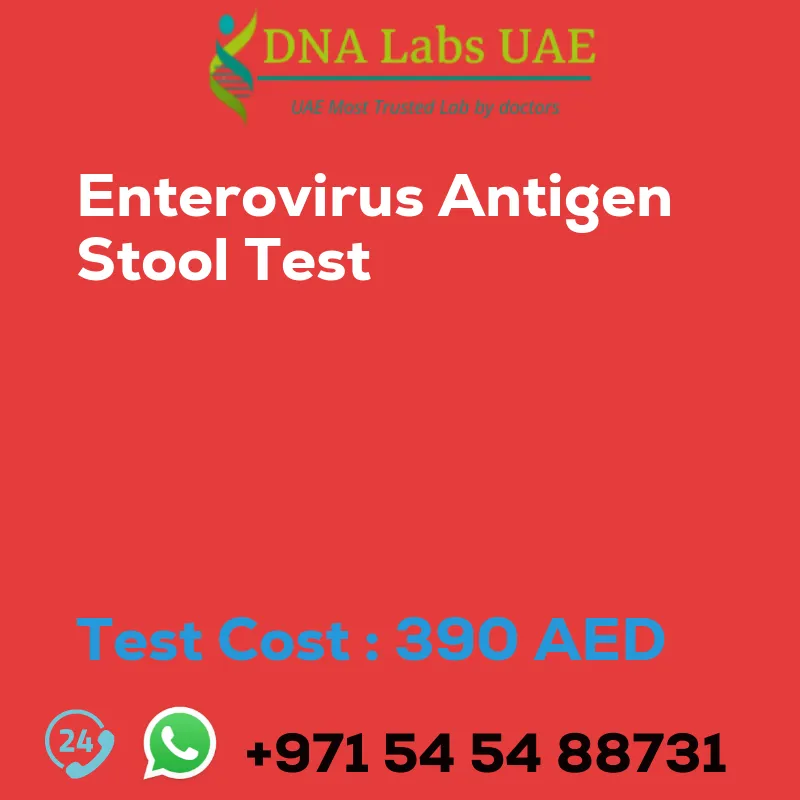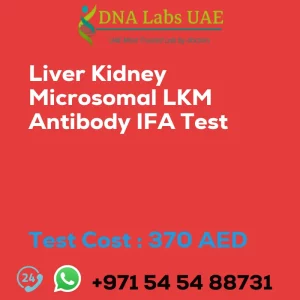ENTEROVIRUS ANTIGEN STOOL Test
Test Name: ENTEROVIRUS ANTIGEN STOOL Test
Components: Enterovirus antigens
Price: 390.0 AED
Sample Condition: 5 g (3 g min.) fresh stool in a sterile screw capped container. Ship refrigerated. DO NOT FREEZE.
Report Delivery: Sample Daily by 1 pm; Report Same day
Method: Immunochromatographic Test (ICT)
Test Type: Disorders of Gastrointestinal System
Doctor: Gastroenterologist
Test Department:
Pre Test Information: No special preparation required
Test Details:
The Enterovirus Antigen Stool Test is a diagnostic test used to detect the presence of enteroviruses in a stool sample. Enteroviruses are a group of viruses that commonly cause gastrointestinal and respiratory infections.
During the test, a small sample of stool is collected and analyzed for the presence of enterovirus antigens. Antigens are proteins found on the surface of the virus that trigger an immune response in the body. The test can detect the antigens using various methods, such as enzyme-linked immunosorbent assay (ELISA) or polymerase chain reaction (PCR).
The Enterovirus Antigen Stool Test is primarily used to diagnose enterovirus infections, especially in cases where the symptoms are consistent with a viral gastrointestinal or respiratory infection. It can help healthcare providers determine the cause of symptoms such as diarrhea, vomiting, abdominal pain, fever, and respiratory symptoms.
It is important to note that the Enterovirus Antigen Stool Test is specific to enteroviruses and may not detect other types of viruses or pathogens that can cause similar symptoms. Other tests, such as bacterial cultures or viral PCR panels, may be needed to rule out other possible causes of the symptoms.
The test results are typically available within a few days, depending on the laboratory’s turnaround time. Positive results indicate the presence of enterovirus antigens in the stool sample, confirming an enterovirus infection. Negative results suggest the absence of enterovirus antigens, but it does not rule out other viral or bacterial infections.
Treatment for enterovirus infections typically involves supportive care, such as rest, hydration, and over-the-counter medications to relieve symptoms. In severe cases, antiviral medications may be prescribed. It is important to consult a healthcare provider for proper diagnosis and treatment recommendations.
| Test Name | ENTEROVIRUS ANTIGEN STOOL Test |
|---|---|
| Components | |
| Price | 390.0 AED |
| Sample Condition | 5 g (3 g min.) fresh stool in a sterile screw capped container. Ship refrigerated. DO NOT FREEZE. |
| Report Delivery | Sample Daily by 1 pm; Report Same day |
| Method | ICT |
| Test type | Disorders of Gastrointestinal System |
| Doctor | Gastroenterologist |
| Test Department: | |
| Pre Test Information | No special preparation required |
| Test Details |
The Enterovirus Antigen Stool Test is a diagnostic test used to detect the presence of enteroviruses in a stool sample. Enteroviruses are a group of viruses that commonly cause gastrointestinal and respiratory infections. During the test, a small sample of stool is collected and analyzed for the presence of enterovirus antigens. Antigens are proteins found on the surface of the virus that trigger an immune response in the body. The test can detect the antigens using various methods, such as enzyme-linked immunosorbent assay (ELISA) or polymerase chain reaction (PCR). The Enterovirus Antigen Stool Test is primarily used to diagnose enterovirus infections, especially in cases where the symptoms are consistent with a viral gastrointestinal or respiratory infection. It can help healthcare providers determine the cause of symptoms such as diarrhea, vomiting, abdominal pain, fever, and respiratory symptoms. It is important to note that the Enterovirus Antigen Stool Test is specific to enteroviruses and may not detect other types of viruses or pathogens that can cause similar symptoms. Other tests, such as bacterial cultures or viral PCR panels, may be needed to rule out other possible causes of the symptoms. The test results are typically available within a few days, depending on the laboratory’s turnaround time. Positive results indicate the presence of enterovirus antigens in the stool sample, confirming an enterovirus infection. Negative results suggest the absence of enterovirus antigens, but it does not rule out other viral or bacterial infections. Treatment for enterovirus infections typically involves supportive care, such as rest, hydration, and over-the-counter medications to relieve symptoms. In severe cases, antiviral medications may be prescribed. It is important to consult a healthcare provider for proper diagnosis and treatment recommendations. |








